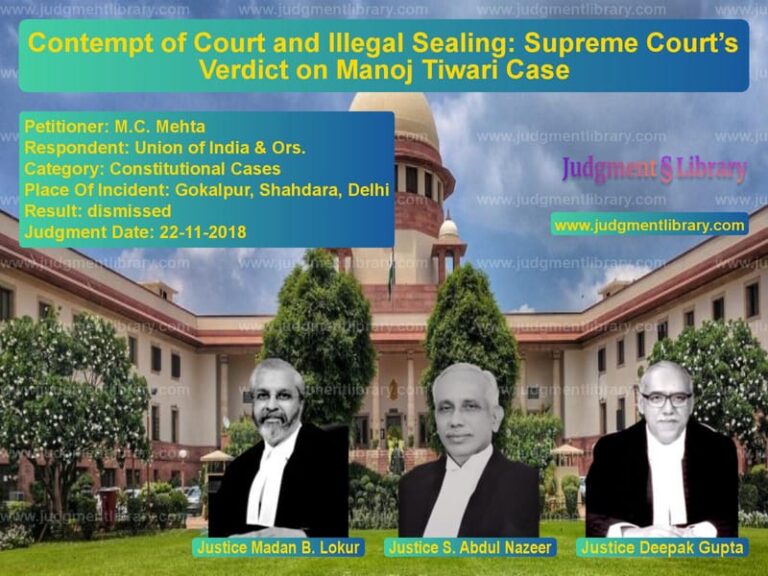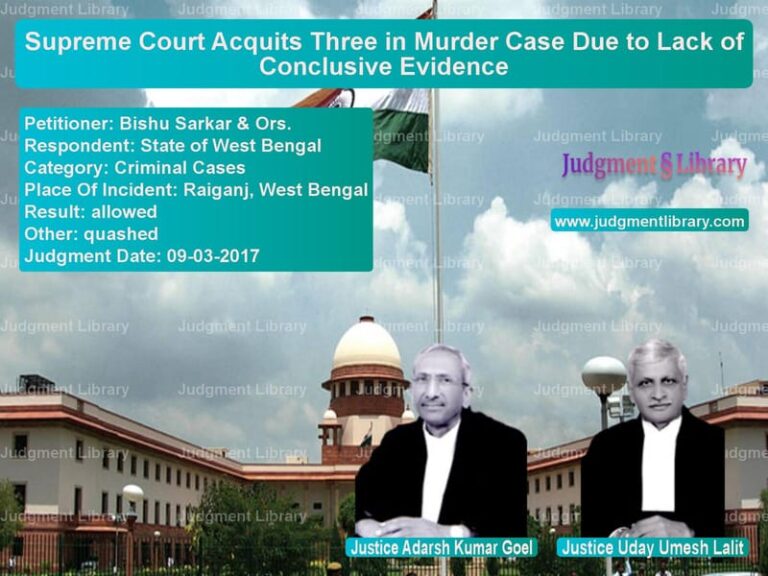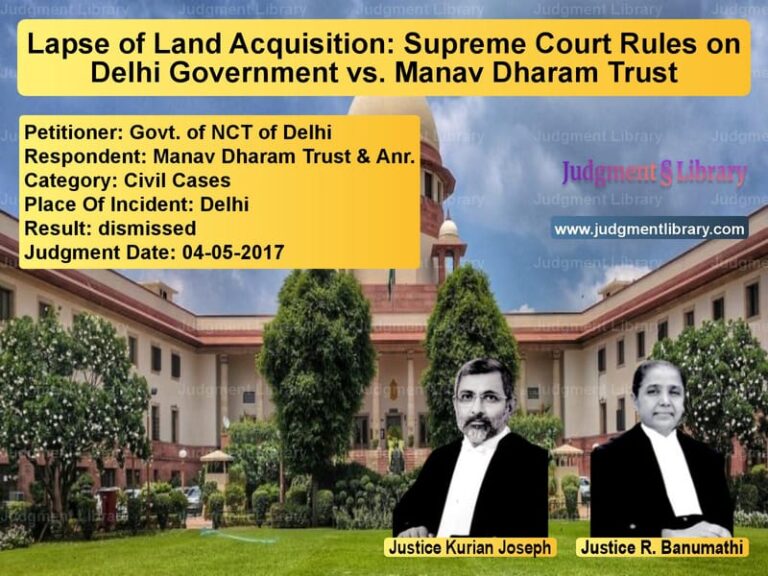Supreme Court Acquits Convict in 1987 Triple Murder Case: Key Legal Analysis
The Supreme Court of India recently delivered a crucial verdict in the case of Chandra Pratap Singh vs. State of Madhya Pradesh, involving the conviction of the appellant for his alleged role in a triple murder case that occurred in 1987. The case raised key legal questions about fair trial principles, common intention under Section 34 of the Indian Penal Code (IPC), and procedural lapses by the High Court. The Supreme Court’s ruling ultimately acquitted the appellant for the charge of murder but upheld his conviction under Section 201 IPC.
Background of the Case
The case involved the murder of three individuals—Uma Prasad, Vinod Kumar, and Munau @ Anant Kishore Khare—on June 2, 1987. The prosecution alleged that a group of accused persons, including the appellant, gathered near a temple armed with weapons and attacked the deceased. The appellant, along with others, was accused of dragging and disposing of the body of Uma Prasad.
The case saw multiple legal proceedings:
- The Trial Court convicted the appellant under Section 302 IPC (Murder) read with Sections 148, 149 IPC and Section 201 IPC (Causing the disappearance of evidence).
- The High Court altered the conviction from Section 302 IPC with Section 149 IPC to Section 302 IPC read with Section 34 IPC.
- The appellant challenged the High Court’s decision in the Supreme Court, arguing procedural lapses and lack of evidence of common intention.
Petitioner’s (Appellant’s) Arguments
- The appellant argued that his lawyer was absent when the High Court heard his appeal, violating his right to a fair trial.
- The High Court altered the conviction to Section 302 read with Section 34 IPC without giving the appellant prior notice.
- There was no evidence of common intention to justify a conviction under Section 34 IPC.
- He played no active role in the attack; his only alleged act was stopping Uma Prasad and later disposing of the body.
Respondent’s (State’s) Arguments
- The prosecution contended that the High Court properly evaluated the evidence before convicting the appellant under Section 34 IPC.
- The appellant was part of a group that carried out the attack, indicating shared intent.
- The appellant actively participated by blocking the deceased’s escape and later disposing of the body.
Key Observations by the Supreme Court
The Supreme Court found several lapses in the High Court’s handling of the case and made the following crucial observations:
1. Violation of Fair Trial Principles: The Court noted that the High Court proceeded with the appeal despite the absence of the appellant’s advocate. The judgment explicitly states, “The High Court has committed a gross illegality by deciding the appeal against the conviction preferred by the appellant without hearing the appellant or his advocate.” This amounted to a denial of the right to legal representation.
2. Improper Application of Section 34 IPC: The Court emphasized that for a conviction under Section 34 IPC, there must be clear evidence of a shared common intention. The Court noted, “There is no material to prove the existence of common intention which is the necessary ingredient of Section 34 IPC.”
3. No Evidence of Direct Participation in the Murder: The Court examined witness testimonies and concluded that while the appellant was present at the scene, there was no overt act on his part that indicated his participation in the murder.
Final Verdict
Based on these findings, the Supreme Court ruled as follows:
- Acquitted the appellant of murder charges under Section 302 read with Section 34 IPC.
- Upheld the conviction under Section 201 IPC (causing the disappearance of evidence) based on strong eyewitness testimony.
- Confirmed that the appellant had already served his sentence for Section 201 IPC and ordered the cancellation of his bail bonds.
Implications of the Judgment
This ruling has several important implications:
- Fair Trial and Legal Representation: The judgment reinforces that courts must not proceed with hearings in the absence of legal representation for the accused.
- Application of Section 34 IPC: The ruling clarifies that courts must establish clear evidence of common intention before convicting an individual under Section 34 IPC.
- Protection Against Wrongful Conviction: The Court ensured that a conviction is not sustained without strong evidence linking the accused to the actual crime.
Conclusion
The Supreme Court’s judgment in Chandra Pratap Singh vs. State of Madhya Pradesh is a landmark decision reaffirming the importance of fair trial principles and proper application of common intention under criminal law. The ruling sets a precedent for ensuring procedural fairness and preventing wrongful convictions in cases involving multiple accused.
Petitioner Name: Chandra Pratap Singh.Respondent Name: State of Madhya Pradesh.Judgment By: Justice Abhay S. Oka, Justice Pankaj Mithal.Place Of Incident: Madhya Pradesh.Judgment Date: 09-10-2023.
Don’t miss out on the full details! Download the complete judgment in PDF format below and gain valuable insights instantly!
Download Judgment: chandra-pratap-singh-vs-state-of-madhya-prad-supreme-court-of-india-judgment-dated-09-10-2023.pdf
Directly Download Judgment: Directly download this Judgment
See all petitions in Murder Cases
See all petitions in Attempt to Murder Cases
See all petitions in Custodial Deaths and Police Misconduct
See all petitions in Judgment by Abhay S. Oka
See all petitions in Judgment by Pankaj Mithal
See all petitions in partially allowed
See all petitions in Modified
See all petitions in supreme court of India judgments October 2023
See all petitions in 2023 judgments
See all posts in Criminal Cases Category
See all allowed petitions in Criminal Cases Category
See all Dismissed petitions in Criminal Cases Category
See all partially allowed petitions in Criminal Cases Category







